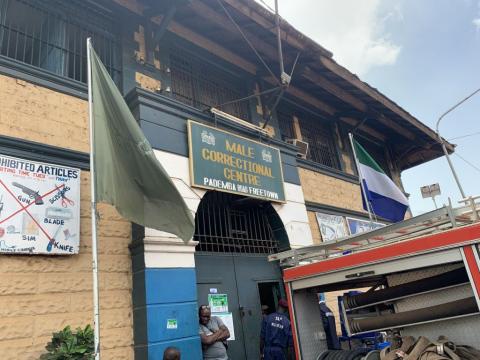By Kemo Cham
The Sierra Leone judiciary has ordered a nationwide cessation of all activities at the magistrate and high courts in an effort to prevent the spread of Covid-19 in the prisons and justice sectors. This, after an inmate tested positive for the virus.
A statement from the office of the Chief Justice said the suspect was on remand at the Pademba Road Prison where he reported ill. He was receiving treatment at the prisons health facility but tested positive for COVID-19 almost a week later.
The inmate, who has been labeled Case 90 by the Emergency Operations Center (EOC), was arrested by the East End Police officers for unspecified offences and was later charged and brought before a magistrate court, No 6, on April 17 before being sent to Pademba Road on the same day where he reported sick on April 20.
The statement says the inmate was admitted at the Male Correctional Center Hospital, where he confessed to having escaped from a quarantine center at Cow Yard, Guard Street, Freetown. He would later be taken to the 34 Military Hospital and subsequently to Connaught on Friday 24 April. On the 26 April he tested positive, according to the statement which was signed by Chief Justice, Desmond Babatunde Edwards.
Consequently, all inmates at the remand section of the prison have been relocated to the Male Re-integration Center in the premises of the former Special Court, which has been designated an Isolation and Observation Unit. This, according to the judiciary, is to allow for the remand center to be disinfected.
As a result, all the inmates there are being transferred to the Pademba Road Male Correctional Facility, the statement added, noting that a temporary medical referral center for the rest of the prison population had been established.
The statement further noted that inmates from the correctional hospital would be treated separately from the others.
For all this to happen, according to the judiciary, hearings and other activities in magistrate courts across the country would be put on hold for at least one month, effective yesterday 28 April “to prevent movement of possible infected persons between detention facilities, courts and prisons.”
The statement says: “All other civil or criminal cases in Magistrate courts are likewise postponed for a month effective April 28, 2020”.
The decision has also caused a delay in the commencement of operations by the newly formed civil rights court, which was slated for 11 May. It is now rescheduled for 1 June 2020.
Several other planned sessions, including the January Criminal Session and a special criminal session which was scheduled to start on May 8, have all been postponed to later dates.
The decision by the judiciary was received with mixed reaction by the public.
Rights campaigners are especially concerned about apparent extra powers the decision has conferred on the police. Some also think it’s unnecessary to halt hearings for such a long period.
According to the statement, the police can use their discretion to give bail as far as possible for new offenders, and to hold serious offenders without bail as they wish.
The Center for Accountability and Rule of Law (CARL) has been one of the most vocal over the issue. Its Executive Director, Ibrahim Tommy, told Politico that while they understood the need for such adjustment within the judiciary, given the prevailing circumstances, there were better ways to address some of the issues without potentially infringing on the fundamental human rights of suspects.
Tommy said the extra powers given to the police were “dangerous” under both local and international laws.
He noted that under the current law, while offenders could be held for only 10 days, this decision stripped the rights of accused persons to appear before a competent court of law for up to 30 days and longer.
“While it is understandable that we cannot fully enjoy our constitutionally guaranteed rights as well as other rights enshrined in various international institutions and instruments, what is important for the state at this point, including the judiciary, is to make sure that we only limit rights that must by all means be limited. In other words, if there are ways of avoiding the restriction of certain rights while at the same time respond to the public health emergency, that’s what we should be doing,” Tommy said.
He added: “Given the wide arrest and detention powers that the police enjoy in this country, I think this is dangerous and truly unsafe to have to confer on them more powers to do so, which is why my position is that the court should put in place an arrangement that allows such persons to be arraigned even if it’s going to be remotely.”
Copyright © 2020 Politico Online








